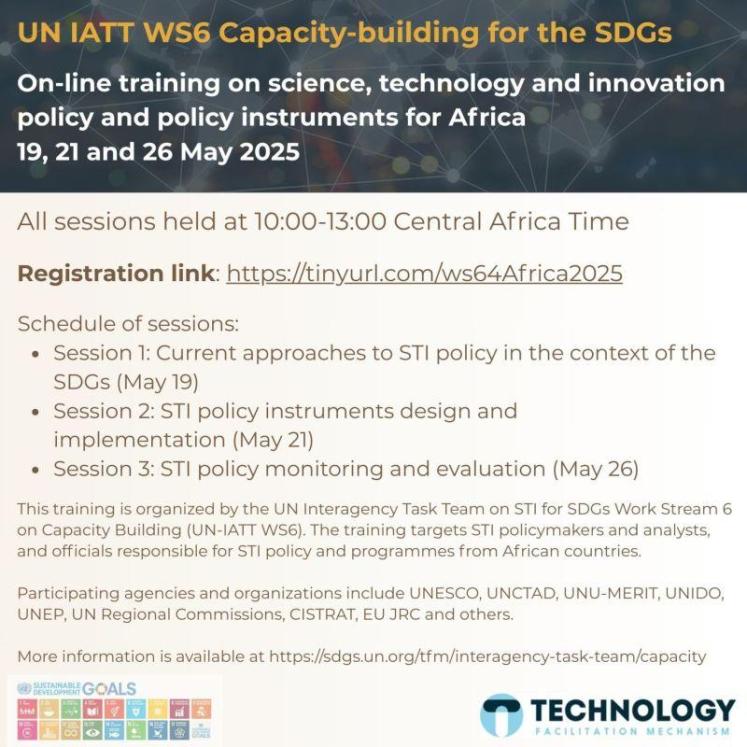On 19, 21 and 26 May, the UN Interagency Task Team on Capacity-Building on STI for the SDGs (UN-IATT WS6) organized a series of 3 online training sessions on STI policy and policy instruments for SDGs for STI officials, policy analysts and experts in Africa. In line with the “One UN” ideology, a UN coalition of experts provided the core training with contributions from UNESCO, UNCTAD, UNU-MERIT, UNEP, and UNIDO. Speakers from the ER-JRC, SADC, ECOWAS, the African Union Commission, CISTRAT, SRIPPRO, CASTED, NACETEM, ScholCommLab, CESTII, SPRU, and ASTII provided additional expertise and local contextual examples.
Since its inception in 2017, the UN Interagency Task Team Workstream 6 (WS6) has expanded its global reach by conducting in-person and online training sessions on STI policy for the Sustainable Development Goals. WS6 provided training for STI stakeholders and policymakers in all developing regions. Dimo Calovski (UNCTAD) is one of the driving forces of the initiative, flags that “By 2025, WS6 had delivered 15 capacity-building events, benefiting more than 1,500 participants from more than 100 countries, with a notable 52% female participation rate, reflecting its commitment to inclusive capacity building”.
The training aimed at building awareness and understanding of key aspects of STI policymaking, design and implementation of policy instruments, and monitoring and evaluating STI policies. The training sessions were followed by 390 participants from 79 countries, of which 36 were African countries – therewith covering a large part of the continent. As Zengmei Wang (UNESCO), moderator of session 1, says, “STI policymaking requires strong capacities across the entire policy cycle—from agenda-setting and formulation to implementation and evaluation. By bringing together various UN agencies and partners, we combine theoretical and practical expertise, offering relevant tools, good practices, and methodologies. This collaboration leverages each agency’s unique strengths, ensures the training comprehensively covers the full policy cycle, promotes efficient use of resources, and enhances coherence by delivering as One UN”.
Session 1 on the ‘Current approaches to STI policymaking in the context of SDGs’ highlighted that STI has great potential, but misalignments with the SDGs limit its impact on urgent social and environmental challenges. To bridge the gap, inclusive and participatory policymaking is essential through every stage of the Policy Cycle. This also requires a shift from national silos to international cooperation guided by inclusiveness, Open Science, and Science Diplomacy. In this context, challenge-led STI roadmaps offer a practical tool to align innovation with local needs and priorities. Effective policymaking must be grounded in evidence. Intergovernmental approaches to producing science must maintain credibility, legitimacy, and relevance. STI policymaking is not one-size-fits-all. It requires a mix of capacities—analytical, operational, and political. In session one, regional examples like STISA2034 and the SADC Protocol on STI showcased the power of regional alignment and inclusive processes.
When covering the design and implementation of STI policy instruments (Session 2), it was clear that many different types of policy instruments can be used to achieve the goals of national STI policy. While funding R&D is an important policy instrument, consideration is needed of other policy instruments - such as procurement and other demand-based instruments, as well as awareness and human capacity building and coordination and organizational activities - to energize the national innovation system. Policy instruments' design and implementation phases may be conceptually distinct but require an integrated approach whereby implementation elements are ingrained in the design rather than positioned as a follow-up activity. The African experience is diverse, including many national and regional STI policy processes and activities. Key challenges lie in the implementation phase. While funding is a challenge, there is also a clear need to build awareness among broad stakeholder groups and governments about the critical importance of STI for sustainable and inclusive socio-economic development.
In session 3, on ‘STI policy monitoring, evaluation and learning’, speakers highlighted that monitoring is needed. Structural monitoring is informative in understanding issues and using evidence for agenda setting. Attention was given to the fact that the purpose of the evaluation is more specific, to understand (causal) relationships between STI policy and intended outcomes and impacts. Therefore, impact evaluations require research designs that must be ex-ante and built on data availability. However, in case data are insufficient for impact evaluations, formative evaluations also allow for learning and development. What was stressed by the speakers was the need to learn from our evaluations. Learning from current settings allows for proposals for changing policy or implementation needs to take place to foster development. Dr. Mindel van de Laar (UNU-MERIT and moderator of session 3) highlights that “throughout the session, it was clear that capacity building (for people but also institutions) and availability of funding are key to foster change. While M&E is needed to serve learning, mainly M&E is essential to ensure that STI policy feeds development, decreases inequality and ensures efficient use of government funding”
For questions, please contact one of the current coordinators:
- Dr. Mindel van de Laar | Capacity Development Office, UNU-MERIT, United Nations University
mindel.vandelaar@maastrichtuniversity.nl - Mr. Dimo Calovski | Economist, Science, Technology and ICT Branch,UNCTAD
dimo.calovski@unctad.org - Ms Zengmei Wang | Science, Technology and Innovation Policy Section, UNESCO
ze.wang@unesco.org





